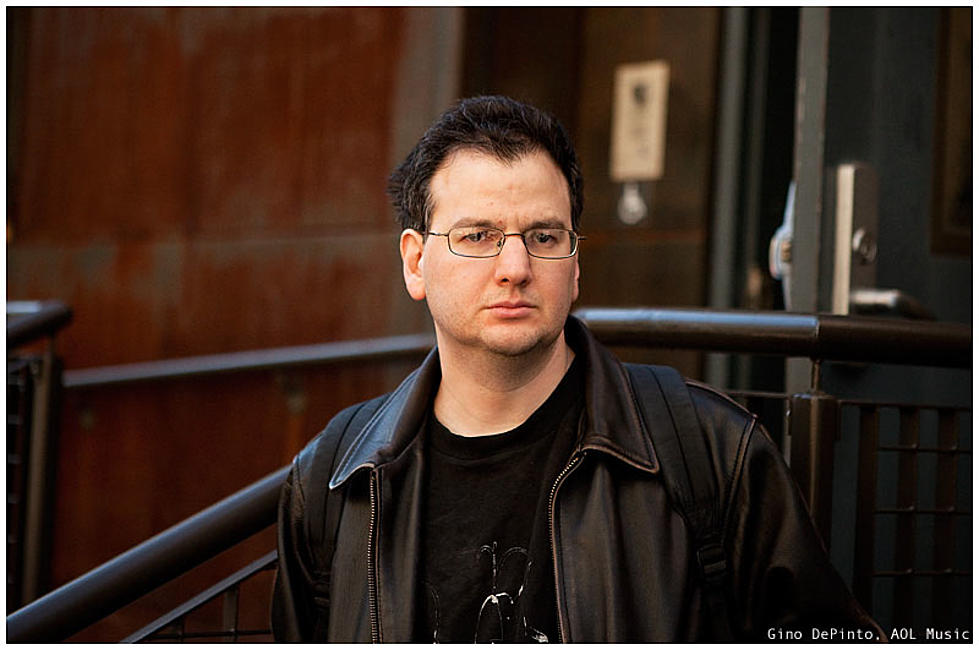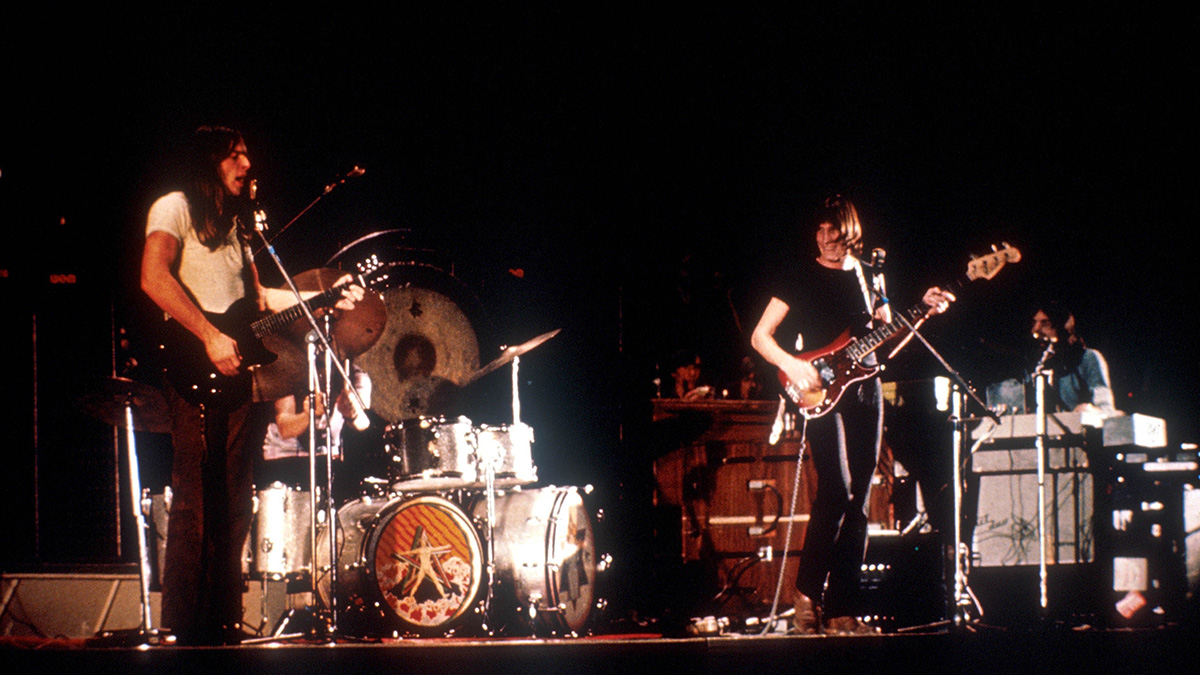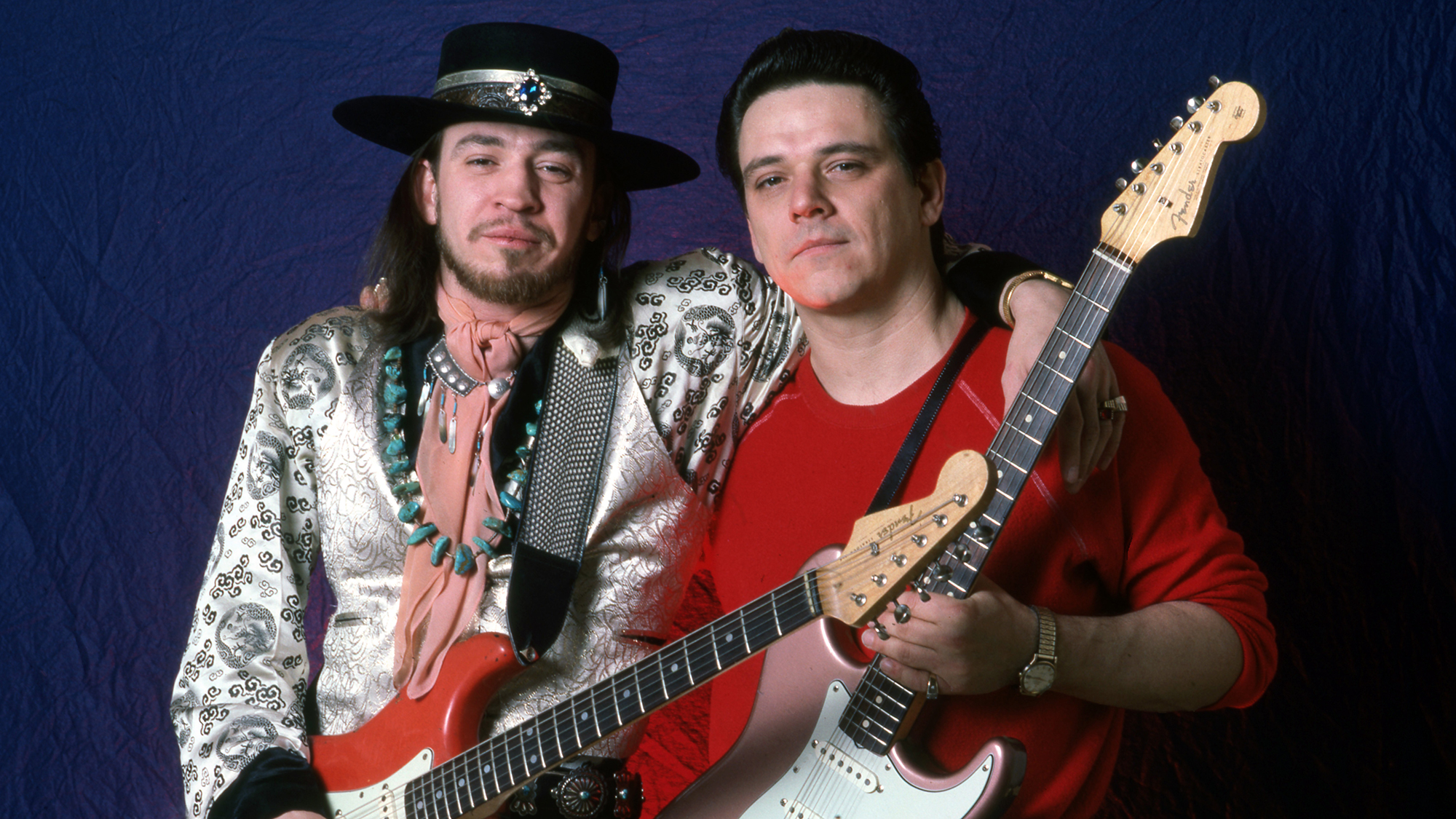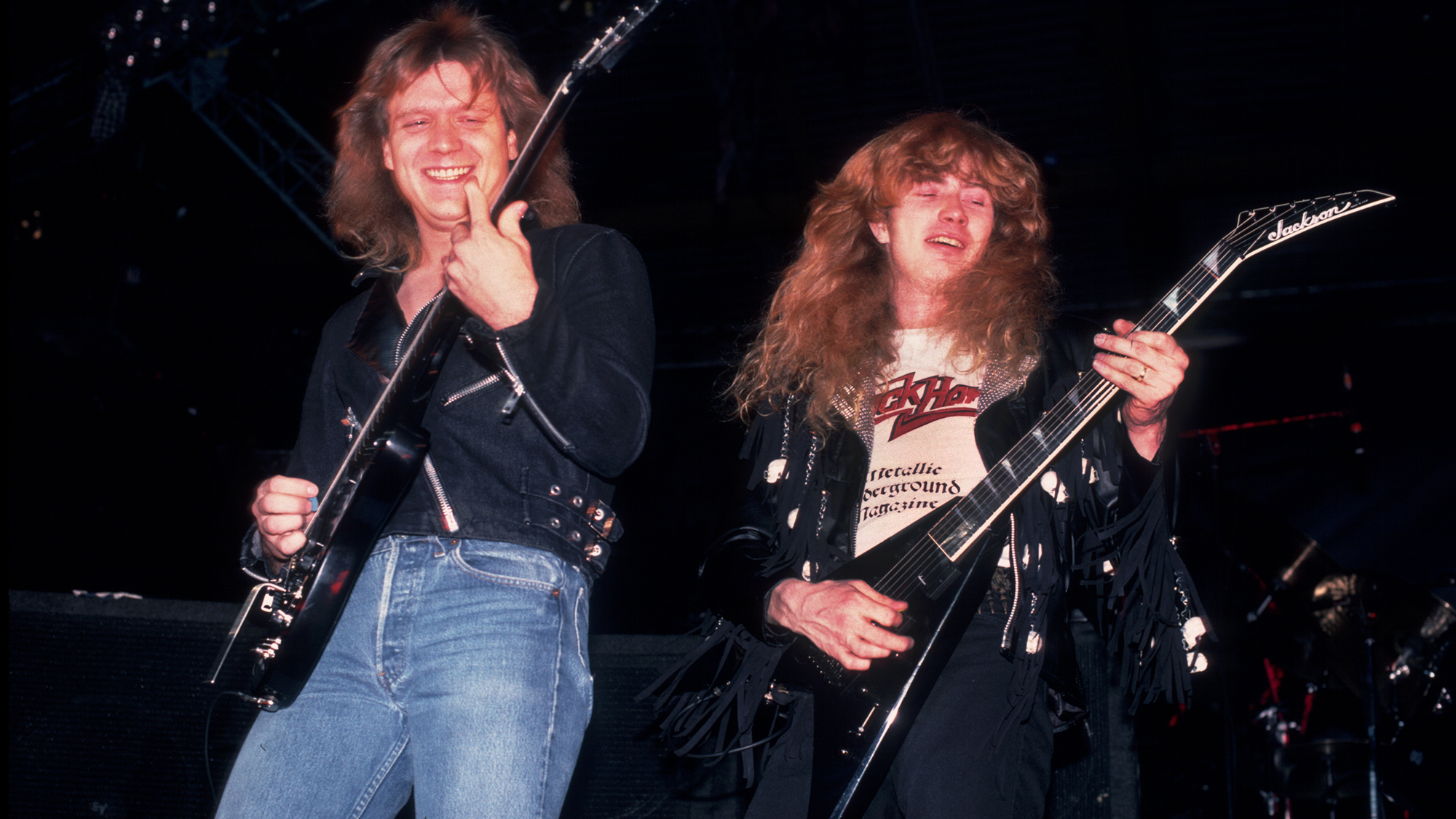Arch Enemy's Michael Amott and Jeff Loomis Talk New Album, 'Will to Power'
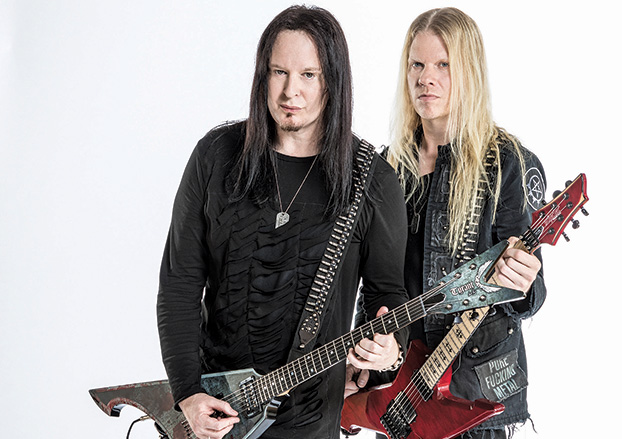
“Well, there’s a first time for everything, right?” says founding guitarist Michael Amott from his home near Gothenburg, Sweden, where he’s taking a few days to decompress before Arch Enemy meet up at their rehearsal space in Frankfurt, Germany.
There, they’ll practice their summer festival set, which includes “The World Is Yours,” the first single from their new album Will to Power.
“You know, sometimes things don’t work out,” Amott says. “I don’t really want to elaborate on that. At the time, it was, of course, surprising. But I called my brother, [band co-founder] Christopher [Amott, who has been in and out throughout the group’s history] and he finished the tour with us. What’s really surprising is that we didn’t miss a show.”
When asked about the incident, Cordle had no comment. “Not interested in anything to do with them,” he texted.
Putting out fires and overcoming challenges has become a regular task for Arch Enemy. The band is currently on its third vocalist; 14-year screamer Angela Gossow quit in 2014 before Cordle left; she currently manages Arch Enemy from her home in Germany. When Christopher Amott wasn’t in the band, Fredrik Åkesson and Cordle played for two years each, the former from 2005 to 2007 before leaving to joining Opeth, and the latter from 2012 to 2014 before joining Sanctuary.
But with every lineup shift came change and, frequently, growth. Gossow’s replacement, Alissa White-Gluz, the 32-year-old former vocalist for the Canadian metalcore band The Agonist, is a personable, charismatic growler with a ferocious death metal roar and a surprisingly pleasant singing voice. As difficult as it is to replace a vocalist, Arch Enemy fans have taken to White-Gluz, partially because Gossow introduced her to the band, and in part because her exuberance and blue hair appealed to the Hot Topic crowd.
The most recent band recruit, ex-Nevermore cofounder and ace lead guitarist Jeff Loomis (who replaced Cordle in 2014) might be the most technically gifted player to join the AE ranks. And he’s stepped in at a great time. Twenty-one years into their career, Arch Enemy could be at the top of their game.
Get The Pick Newsletter
All the latest guitar news, interviews, lessons, reviews, deals and more, direct to your inbox!
Will to Power is a striking, musically diverse album that combines elements of thrash, Gothenburg-style melodic death metal and stomping traditional metal with progressive touches. The tracks are highlighted by Amott and Loomis’ abundant guitar harmonies and fiery leads.
The video for the fiercely melodic “The World Is Yours” had accumulated nearly 4.5 million views less than a month after it was posted, and Arch Enemy just announced a co-headline U.S. tour with Trivium that runs through December 6 in Houston and could expose Arch Enemy to a younger, more mainstream following.
“I never considered Arch Enemy to be a death metal band, and I didn’t start Arch Enemy with the intention of being death metal,” stresses Amott. “I’ve already done that type of stuff [as a member of Carnage and Carcass], so I wanted to focus more on melody, while still keeping the music heavy. And I think this record does that.”
(from left) Arch Enemy's Daniel Erlandsson, Michael Amott, Jeff Loomis, Alissa White-Gluz and Sharlee D'Angelo
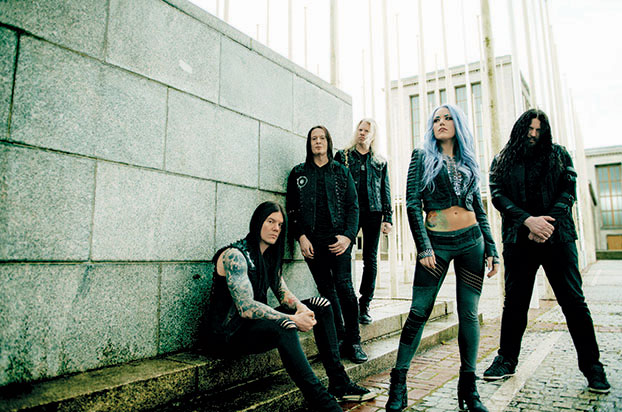
While Loomis was Amott’s first choice to fill in for Cordle, Arch Enemy’s architect was afraid Loomis wouldn’t accept the offer. “I always tell Jeff he’s overqualified for the gig,” Amott says, then laughs. “But having a high-profile guitar player join was really great for us. He plays amazing stuff almost without effort, and I’m still sitting here struggling to figure out how to hold a guitar pick.”
Loomis first met Amott in 1999 when Arch Enemy and Nevermore were playing some of the same festivals. The two bands toured Europe together in 2003, though Arch Enemy had to pull out of the last few shows after their bus was infested with blood-sucking insects and some of the members became ill. Impressed by Loomis’ playing, Amott asked him to join Arch Enemy in 2005, when Christopher quit for the first time, but Loomis was committed to Nevermore and turned down the offer.
When Loomis broke up Nevermore in 2011, largely because he was having problems with alcohol and needed to dry out (“Moderation definitely wasn’t in the dictionary next to the Nevermore name”), he went cold turkey until he was sober, then started looking for another gig. Come November, he will have been sober for five years. Staying sober was easier for Loomis than finding the right project. He staged clinics and put out the solo album Plains of Oblivion in 2012, but it didn’t connect with Nevermore audiences the way he had hoped it would. Besides, he wanted to play in a band again, so when Amott called him for the second time, Loomis leaped at the opportunity.
“Being a big fan of Arch Enemy and knowing most of their catalog already, and all their songs, I was really blown away when Michael asked me to be in the band again,” says Loomis. “It was definitely a no-brainer. I said yes immediately because I loved their music and they seemed to be getting bigger. I was like, ‘Yeah, man. Let’s do it!’ ”
There was no time for Loomis to celebrate, even with non-alcoholic beverages. Arch Enemy had a European tour booked with Kreator in two weeks and Loomis had to learn numerous guitar parts. “Everything happened so fast, it was crazy,” he says. “By the time I felt somewhat confident with the material, I was already on a plane to France.”
Before he learned the solos note-for-note from the band’s past albums, he sometimes had to improvise the middle part of a lead. Even so, he fit right in, his virtuosic playing style complimenting Amott’s cutting, bluesy Michael Schenker–esque approach.
“Once Jeff came into the band you could definitely feel a shift from gray clouds to blue sky,” White-Gluz says from her home in Montreal, Quebec. “He’s so chill and polite and he’s such a nice dude. And he’s so humble, even though he’s crazy-talented.”
For Loomis, the greatest challenge was playing six-string guitars instead of the seven-strings that have been his go-to instruments since 2000. So Loomis, who practiced for 16 hours a day as a teenager to learn his craft, applied some of that discipline to breaking in his Schecter JL6, the six-string model of his signature JL7. In no time, he was as adept on a six-string as he is on a seven.
“The only thing that was a little weird was that when I played six-string guitar in the past I was used to A440 tuning, and the tuning for Arch Enemy goes down to C standard, which is two whole steps down,” he says.
He thought finding the right string gauge would do the trick. He tried out extra heavy Ernie Ball strings and it felt “like playing piano wire.” So he switched to lighter strings—.060 to .01—which were just substantial enough so he could use a tremolo on his leads and bend the strings without breaking them very often. He replaced his light picks with a heavy, pointed plectrum to give his playing a more aggressive attack.
Once Arch Enemy had played around 300 shows to support their 2014 album, War Eternal, their first to feature White-Gluz, the band’s label execs encouraged them to record a new album. In mid-2016, Amott presented the company with a demo of “The World Is Yours,” which he wrote in 2014. They loved it and asked to hear more, and he admitted he only had bits and pieces of other songs.
So, after playing a few shows in Mexico in late 2016, Amott and band co-founder and drummer Daniel Erlandsson rented an apartment in Cancun to write for 10 days. A winter party mecca south of the border might seem like a strange place for a couple of Swedes to work, yet Amott and Erlandsson were motivated, diligent and productive.
“We didn’t get drunk once!” Amott insists. “It was great because being away from home, there weren’t the usual distractions from making music. Every day we just went for a swim in the morning and had breakfast and then started writing metal.”
The two came up with some great passages, but no full songs. Then they put together the framework for the mid-paced, steady-riffing “The Eagle Flies Alone,” and the doors of creativity opened up.
“I came up with practically the whole thing completely on the spot and it turned the record around,” Amott says. “I have found that when you have that first song that you’re really happy with, you go, ‘Alright, now we can start making the record.’ ”
Amott wrote four other full songs in Mexico, then flew back to Sweden and, between gigs, continued writing in his home studio. At one point, he asked Loomis—who was the primary songwriter in Nevermore—if he had any songs to contribute and Loomis was almost ashamed to admit he hadn’t written anything.
“When they started writing, the album came together really fast,” Loomis says. “I did submit three songs, but I think I might have missed the deadline. I feel really bad about that, but at the same time, I didn’t want to be the new guy coming in saying, ‘Okay, here’s a bunch of new songs I wrote. Let’s go record them.’ So I only did those three and honestly, I don’t think they were in the Arch Enemy style.”
“I feel lucky just to have Jeff playing solos on the record,” says Amott. “I know he is such a high-profile guitar player and his role in Arch Enemy is not what people might expect. I’ve always written most of the music in this band and that’s what I do. Right now, he is more about playing guitar solos and he seems to really get that.”
While Amott fine-tuned the demos in Sweden, Loomis mapped out his solos at his home studio in Seattle. Since he had been playing every lead on tour exactly as it appeared on the albums, he looked forward to putting his own signature on the new tunes. “Michael sent me the demos and I really listened to the songs and tried to match them with my playing,” Loomis says. “It wasn’t like in Nevermore when I just went into the studio and improvised. I planned everything out. Like, ‘The World Is Yours’ is extremely aggressive, so I did the math in my head and utilized really fast picking and played in harmonic minor so it flowed with the song.”
Loomis recorded his solos using his Schecter signature JL6 and a Line 6 Helix modeled after an old Peavey 5150. Then he used effects to boost the gain and added reverb and chorus. “I want to achieve that sheer metal tone, so there’s a lot of distortion with a gate in front of it for double stops,” he says.
Amott unfurled his Dean Tyrant V. He recorded the rhythms over a three-week period at the Sweetspot Satellite Studio in Halstad, Sweden, using a Kemper Profiler. Once the rhythms were tight enough, the DI tracks were re-amped through Marshalls and Mesa/Boogies by mixing engineer Jens Bogren.
In April 2017, Loomis flew in to track his solos at the Sweetspot Studio in Harplinge 90 minutes south of Gothenburg. Amott blocked out a week for Loomis to track, and before he arrived he constructed a variety of different tones using live amps, including the JCM800, 2205, a JMP 100-watt head and a JVM 50-watt head. Once they started tracking, though, it took Loomis only two days to finish his solos. More than half of the leads he had pre-written worked perfectly, and the guitarists worked together to tweak and fine-tune the others.
“For some of the leads I wanted a slightly different flavor than what Jeff came up with,” Amott explains. “Making a record is kind of like directing a movie. When the vocals stop, the lead guitar takes over and it’s got to have a dramatic flow. It’s got to tell a story. So I had some ideas for parts for him to play to help keep the songs moving. And Jeff was super open-minded. He has zero ego. He just wants to play for the song and make everything work as well as it can.”
In addition to featuring a new caliber of guitar solos, Will to Power contains Amott’s first metal semi-ballad, “Reason to Believe.” The track features undistorted guitar arpeggios (the only part recorded with a Gibson SG), wispy keyboards and a slow beat before bursting into a chunky midsection and an anthemic chorus. The song provided White-Gluz the opportunity to balance her grizzly-bear growls with clean, melodic singing.
“I’ve always been fearless when it came to vocal techniques, but in the context of Arch Enemy I hadn’t really explored all these colors before,” White-Gluz says. “But I do think with Will to Power we had a natural evolution where I unleashed a little bit more. It’s so easy to go all-out all the time in metal, but having dynamics is what makes for a great album.”
Amott wrote “Reason to Believe” with his brother Christopher (who’s now living in New York) when the family got together last Christmas. Following some stilted conversation and awkward silences, the siblings excused themselves and picked up acoustic guitars.
“The only way we communicated was by playing guitars at my parents’ house,” Amott recalls. “We came up with that piece of music and the next day we recorded it at my place.”

Amott’s not about to let Arch Enemy turn into a mainstream, progressive or symphonic metal band, and Will to Power, while more concise, is just as heavy as War Eternal. At the same time the guitarist admits he had more fun writing the fragile parts of “Reason to Believe,” the emphatic guitar harmonies on the instrumental “Saturnine” and planning the sweeping orchestral section for “A Fight I Must Win” than he did writing and playing the thrash/death riffs on “Murder Scene” or the galloping, descending guitar passages on “First Day in Hell.”
“Having melody in the music is what interests me the most,” says Amott. “The heavy stuff is super-easy. It just flows naturally from my mind. Sometimes I get an idea for lyrics or a melody and I instantly hear all of the guitars and the rest of the song in my head. I don’t know if that makes me the Paul McCartney of death metal, but I’ve been doing this a long time.”
Listening back to Will to Power, Loomis is content with the thumbprint he made with his leads and is looking forward to busting out more of his original playing live. He also hopes to contribute more songwriting to the next record. At the same time, he’s planning to keep himself balanced creatively by experimenting with extreme instrumental music, both with his long-delayed solo album and the second record by his side project Conquering Dystopia, which features guitarist Keith Merrow, bassist Alex Webster (Cannibal Corpse) and drummer Alex Rüdinger (ex–the Faceless).
“I’m so lucky I’m able to play these shows in front of thousands of people with Arch Enemy and then go off into another side of myself guitar-wise and explore a different kind of music,” Loomis says. “It keeps me really busy, but I couldn’t ask for more. I feel right at home with Arch Enemy. They’re my metal family. I think it’s gonna last for a while—as long as we can do it, anyway.”
Amott, too, looks to the future with optimism. Arch Enemy plans to tour for Will to Power for at least the next 18 months, but during weeks off he hopes he and Loomis will be able to write together. And he’s not at all concerned that Loomis will be another member who leaves two years after playing on his first Arch Enemy album.
“It’s so easy to work with Jeff and he has such a great attitude that I can’t imagine having any problems,” he concludes. “And I can see him having a bigger part writing in the future. Of course, that won’t change the band. We have been around for a long time and we have a certain sound, so our direction is always pretty similar. It’s just evolving and becoming more refined, and I think Jeff will be able to be a big part of that.”
Jon is an author, journalist, and podcaster who recently wrote and hosted the first 12-episode season of the acclaimed Backstaged: The Devil in Metal, an exclusive from Diversion Podcasts/iHeart. He is also the primary author of the popular Louder Than Hell: The Definitive Oral History of Metal and the sole author of Raising Hell: Backstage Tales From the Lives of Metal Legends. In addition, he co-wrote I'm the Man: The Story of That Guy From Anthrax (with Scott Ian), Ministry: The Lost Gospels According to Al Jourgensen (with Al Jourgensen), and My Riot: Agnostic Front, Grit, Guts & Glory (with Roger Miret). Wiederhorn has worked on staff as an associate editor for Rolling Stone, Executive Editor of Guitar Magazine, and senior writer for MTV News. His work has also appeared in Spin, Entertainment Weekly, Yahoo.com, Revolver, Inked, Loudwire.com and other publications and websites.
